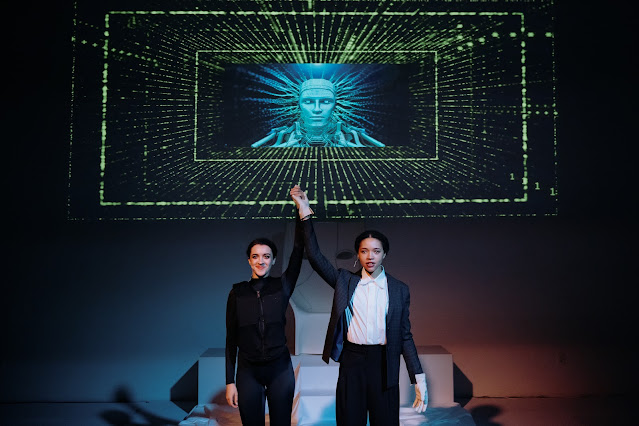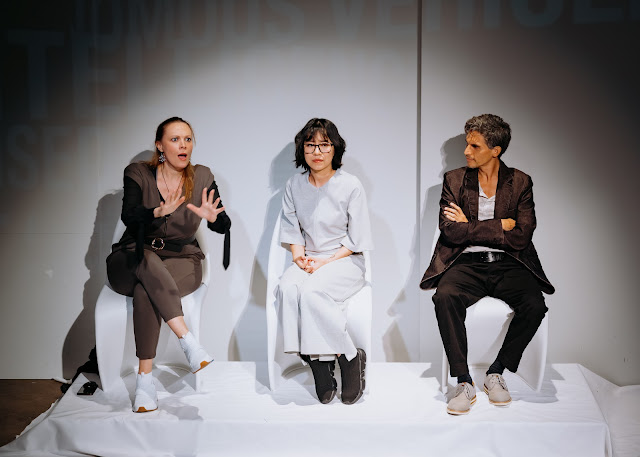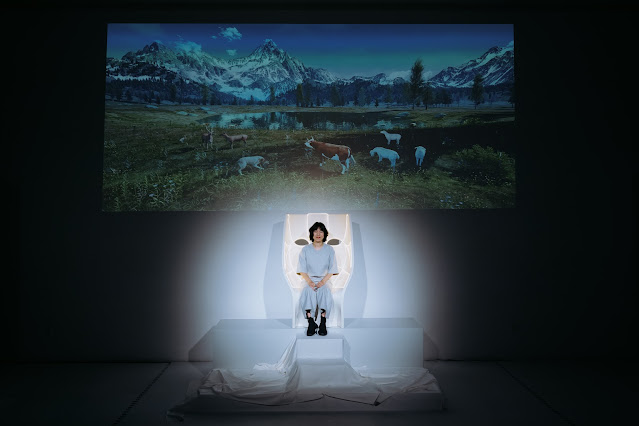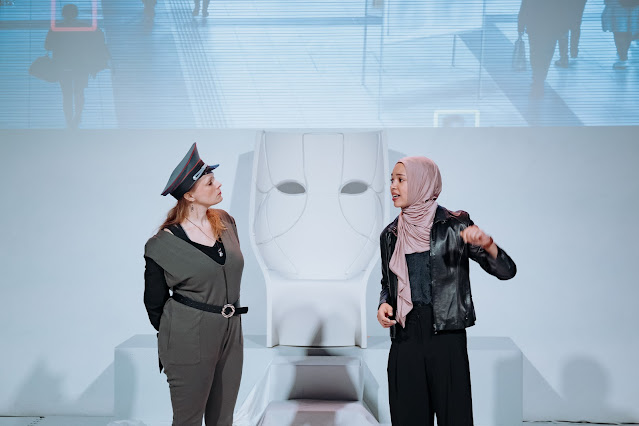Bioadapted
Created and directed by Tjaša Ferme
Assistant directed by Nasay Ano
Written by James Yu, Alexis Roblan, and Tjaša Ferme and sourced from various transcripts Presented by Transforma Theatre at Culture Lab LIC
5-25 46th Ave., Queens, NYC
September 7-24, 2023
 |
| BIOADAPTED, featuring Melody Munitz and Arianne Banda. Photo Credit: Dinara Khairova |
Conversations about A.I. have become mainstream if not inescapable, particularly in regard to large language models and their existing or potential effects in areas ranging from education to art and performance to journalism to climate collapse.
Bioadapted, created by award-winning actor, playwright, and creator Tjaša Ferme and making its world premiere at Culture Lab LIC, generates its own wide-ranging consideration of A.I., melding fiction and verbatim text from real panels, interviews, and even a published essay composed by GPT-3 itself. The thought-provoking, the humorous, and the dystopian rub disembodied shoulders as
Bioadapted imagines a present and future more and more tightly enmeshed with technologies of which we have less and less control and understanding.
 |
| BIOADAPTED, featuring Annemarie Hagenaars, Thammie Quach, and Juan Cardenas. Photo Credit: Dinara Khairova |
When thinking about technology and sentience, the idea of humanity falling under the thumb of robot overlords has been repeated so often as to have become an ironic joke even as it remains an actual anxiety. So it is appropriate that
Bioadapted begins with an essay published in 2020 that was the result of
The Guardian asking GPT-3 to "
convince us robots come in peace" (through the production, projections identify which narrative or source is being presented by any given segment, including a panel that Ferme herself was on, played here by Stephanie White). With black costuming contrasting the white-dominated performance space, Melody Munitz plays the A.I., giving embodied voice to its words. Munitz wears a vest with haptics and LED lights that is linked with an EEG headset that generates BCI (brain-computer-interface) instructions for movement, an element that, in addition to its sci-fi aesthetics, has an increasing and thematically important effect as the play–along with Munitz's impressive and progressively physical performance–proceeds. (It is interesting that we so often imagine A.I.s within human-like bodies and as expressing wants or other sensations that would seem to be unlikely or perhaps impossible without biological embodiment. One might connect such questions with a part of the play in which professor and neuroscientist Moran Cerf [Juan Cardenas] discusses how our perceptual organs determine what we conceive of as but is only a sliver of reality).
 |
| BIOADAPTED, featuring Thammie Quach. Photo credit: Dinara Khairova |
Following this opening, Bioadapted engages with other contemporary touch points, such as Google's attitude towards A.I. ethics and, in an excellent scene between Annemarie Hagenaars as a cop and Arianne Banda as a traveler in Penn Station, the biases embedded in the creation and deployment of facial recognition systems, but it also begins to introduce more speculative sections, such as in excerpts from Alexis Roblan's Affinity, which uses the concept of corporations creating bespoke media for individuals based on collected biodata to ask fascinating questions such as whether such tailoring is empowering or manipulative and whether better representation in media makes a difference if not everyone gets the same version (it seems worth noting that video game culture provides a primitive form of representational tailoring yet continues to be suffused with racism and sexism); and scenes in which a woman named Netta (Thammie Quach) debates some of this with her partner, Eniko (Banda) and her coworker, Alicia (Hagenaars), are sharp, funny standouts.
 |
BIOADAPTED, featuring Annemarie Hagenaars and Arianne Banda. Photo Credit: Dinara Khairova
|
Before the show ends, the sci-fi elements will become more advanced and more dystopian–an arc following a couple, Lina (Quach) and Gus (a hilarious Cardenas), is very funny, but the possibilities that its satire points to are substantially less so; and another arc, excerpted from
Singular: Possible Futures of the Singularity, written by James Yu in conversation with GPT-3 and dealing with humans' inability to understand A.I.s' communications with one another, both recalls the earlier discussion of gulfs in perception and fascinates in its own right. As with other parts of
Bioadapted, we can see extrapolations on how we don't completely understand how A.I. such as large language models "thinks" once set in motion, and how it has been found to be extremely difficult to make an A.I. unlearn something. The show concludes by allowing the audience to put questions to GPT-4 in real time, to, in the play's parlance, put it on trial, an intriguing way to bring the entire piece full circle.
Bioadapted is engrossing, well paced, and consistently visually impressive, and its intermixing of fact and fiction seems quite fitting for thinking about GPT and similar A.I.s. So see it now, while it's still only partly documentary.
-John R. Ziegler and Leah Richards







Comments
Post a Comment